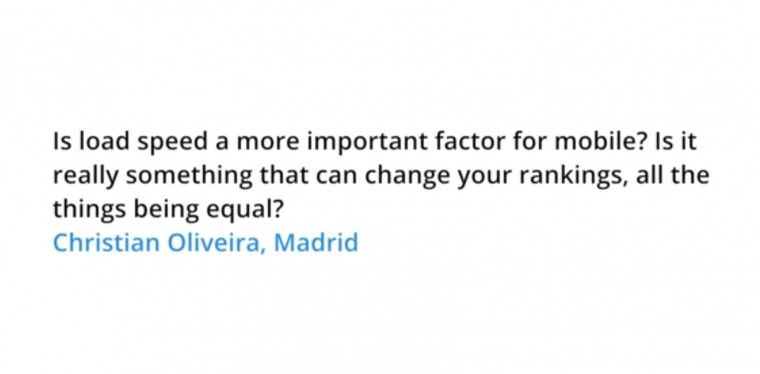
Oggi Matt Cutts risponde ad una domanda relativa alla velocità di caricamento delle pagine. Già in passato si era discusso nella SEOsfera italiana relativamente a questo argomento soprattutto partendo da questo articolo che parlava di una futuribile introduzione della Site Speed Penalty per siti mobile troppo lenti.
Da questo era nata poi una interessante diatriba sulla velocità come fattore di ranking con conseguente discussione molto interessante sui benefici o meno di avere una pagina veloce, che sono andati ben oltre la SEO (come giusto che sia).
La domanda posta a Cutts è stata la seguente:
Is load speed a more important factor for mobile? Is it really something that can change your rankings, all the things being equal?
e la risposta nel video da cui estrapoliamo la trascrizione grazie a WebProNews.
“Let’s start with the second part of that question: all things being equal,”
“If your site is really, really slow, we’ve said that we do use page speed in our rankings. And so all of the things being equal, yes, a site can rank lower. Now, we tend not to talk about things in terms of like an absolute number of seconds because websites do work differently in different parts of the world, and there’s different bandwidth and speeds in different parts of the world. However, it’s a good way to think about it to say, ‘Okay, look at your neighborhood of websites. Look at the sites that are returned along with you, and then if you’re the outlier. If you’re at the very bottom end because your site is really, really slow, then yes, it might be the case that your site will rank lower because of its page speed.”
“Now, what’s interesting is that that factor applies across the board,”
“It’s not specific to mobile…it’s not that in mobile we apply that any more or less than we do for desktop search, but if you’re using your mobile phone, you do care a lot about whether it will load in a reasonable period of time. So we’ll continue to look at ways to improve the ways that we find out how fast a site is, the page speed for a particular page, and then try to figure out whether it makes sense…okay, if we want users to be less frustrated, then maybe it does make sense to incorporate that more into our rankings or more for mobile Something along those lines.”
Insomma l’interesse nel migliorare questo aspetto sembra esserci, ma come discusso già durante la diatriba della premessa bisogna capire quanto.
Personalmente credo che se la SEO viene vista come comprensione e soddisfazione dell’utente che arriva dal motore di ricerca allora questo fattore non va messo in discussione nemmeno per un istante.



![<b>[Breaking News] In arrivo una Site Speed Penalty per il mobile e altre storie della giornata</b>](https://cdn.searchon.it/?url=storage.ibrida.io/public/gt/files/2013/06/lumaca-75x75.jpg)
Salve,
vorrei togliermi una curiosita’ in merito al tempo di caricamento e mi sembrano l’articolo e l’autore piu’ adatti. 🙂
Quando si “stoppa il cronometro” per stabilire quanto tempo impiega la pagina per caricarsi?
Mi spiego meglio. Immagino che il cronometro parta quando si clicca su “vai” dopo aver digitato l’URL nel browser. Ma quando si ferma? Dopo il caricamento dell’HTML e del jQuery o viene atteso anche il caricamento delle immagini e di tutto il resto finche la pagina non e’ completa?
Spero di essermi spiegato.
Grazie mille a chi vorra’ rispondere! 🙂
Ciao
Zep
Ciao Zep la risposta più completa alla tua domanda è qui https://dvcs.w3.org/hg/webperf/raw-file/tip/specs/NavigationTiming/Overview.html